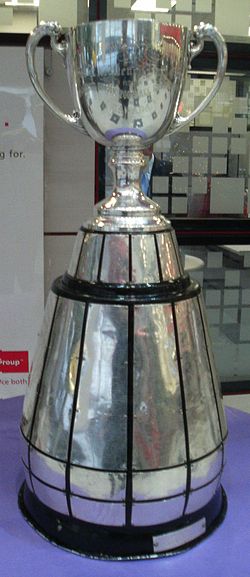
The Grey Cup is the championship of the Canadian Football League (CFL) and the trophy awarded to the victorious team. The trophy is named after Albert Grey, the Governor General of Canada from 1904 until 1911. He donated the trophy to the Canadian Rugby Union in 1909 to recognize the top amateur rugby football team in Canada. By this time Canadian football had become markedly different from the rugby football from which it developed. Although it was originally intended to be awarded only to amateur teams (like the Stanley Cup), over time, the Grey Cup became the property of the Canadian Football League as it evolved into a professional football league. Amateur teams ceased competing for the Cup by 1954; since 1965, the top amateur teams, playing in U Sports, have competed for the Vanier Cup. [1]
Contents
The Grey Cup game is Canada's largest annual sports and television event, regularly drawing a Canadian viewing audience of about 4 million. [2] [3] Two awards are given for play in the game, Most Valuable Player and the Dick Suderman Trophy as most valuable Canadian player. [4] As a member of the Winnipeg Blue Bombers, Andrew Harris was the first player to win both the Dick Suderman Trophy and the Grey Cup Most Valuable Player the same year, which he did in 2019.
The Winnipeg Blue Bombers have made the most appearances (29), while the Toronto Argonauts have won the most championships (19) and have the best record in the Grey Cup composite standings (19–6). Despite the CFL's brief U.S. expansion era in the mid-1990s, the Grey Cup has never been played outside of Canada. The Baltimore Stallions were the only American team to appear in the Grey Cup (twice, losing in 1994 and winning the following year).
Although the first Grey Cup game was in 1909, none were played from 1916 to 1919 or in 2020, thus the most recent final was the 112th Grey Cup game which was played on November 16, 2025, at Princess Auto Stadium in Winnipeg. The Saskatchewan Roughriders won their fifth championship in franchise history, defeating the Montreal Alouettes.